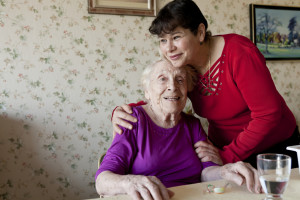 You’ve done the huge pile of laundry and ironing. You’ve made the bed and changed the linens for the second time today. You’ve done bath time, made dinner and run errands. It’s been a long day and you’re exhausted.
You’ve done the huge pile of laundry and ironing. You’ve made the bed and changed the linens for the second time today. You’ve done bath time, made dinner and run errands. It’s been a long day and you’re exhausted.
Although this may sound like a typical day in the life of a busy parent, it’s not. It’s a day that many grown children are experiencing right now as the primary in-home caregivers for their elderly parent(s).
As children, we are so used to our parents taking care of us that when it is time for the shoe to be on the other foot, so to speak, it can be completely overwhelming and stressful. To help you keep your head above water on the days when it’s all a bit much, unwind and regain your composure with meditation.
Meditation can:
- Increase patience in stressful situations and because your parent will feed off of your “frazzled” energy, helps to keep him or her calm and peaceful as well, creating a mutually beneficial positive care giving environment (click here to read some of the benefits of meditation for the elderly). A few deeps breaths can go a long way in diffusing a tense situation with your parent (i.e. him or her not wanting to take their required medicine).
- Help keep your entire body healthy by freeing the stresses that you hold onto both physically and mentally which, when not released, can cause you to become ill and fatigued.
- Allow you to be wholly present in the moment. For example, if you are caring for someone suffering from Alzheimer’s and that person is having a lucid moment and really enjoying your visit, mindfulness meditation can help you to fully immerse yourself in that moment rather than focusing on what happens next or wishing there were more of those particular moments. This time spent enjoying time each other’s company reminds you of the value in what you are doing. It also gives you something positive you can store in your memory banks for later.
- Provide (or renew) feelings of solace, faith, and security: Even when the parent you have known your whole life is changing right before your eyes in ways that can be hard to see, meditation can help to keep you grounded and give you strength to face those changes.
So on those busy days, how do you find time to incorporate meditation into your schedule as a caregiver?
Here are a few ways caregivers can add meditation to their day:
- Meditate together with your parent using a guided meditation when you have a few quiet moments of relaxation.
- Take advantage of any break you get (even if it’s while you wait for your parent at a doctor’s appointment) to practice mindfulness, perhaps doing some calming deep breathing.
- Make it a part of your day by “adding” it to your caregiver schedule – i.e. meditate when your parent is napping or when someone comes to relieve you for a break. Make that your cue that it is time for a few minutes of meditation, start with something short and sweet say 3 or 4 minutes of mindfulness. Soon it will become an enjoyable habit you look forward to for the peace it brings to your day.
Let meditation be something you do to take care of yourself so that in turn you can be the best caregiver for your parent. Practicing meditation as a means of self-care will go a long way in helping you to relieve stress, fight feelings of negativity, discouragement, frustration, or even depression. Allow meditation to be the break you take to feel better as you tackle your day.
To your inner strength – Anna


 The Washington Post recently ran an interesting article chronicling the study of one Sara Lazar, a neuroscientist at Massachusetts General Hospital and Harvard Medical School. Her study looked at the effects of meditation on the brain.
The Washington Post recently ran an interesting article chronicling the study of one Sara Lazar, a neuroscientist at Massachusetts General Hospital and Harvard Medical School. Her study looked at the effects of meditation on the brain. We’ve talked a lot about the relationship between meditation and pain and the valuable role that mindfulness plays in the equation. However, we have yet to delve into the research behind the relationship between mediation and pain management.
We’ve talked a lot about the relationship between meditation and pain and the valuable role that mindfulness plays in the equation. However, we have yet to delve into the research behind the relationship between mediation and pain management.
 We’ve all been there. Those days at work when nothing seems to go right and you’re stressed out, can’t concentrate, and have zero patience with your colleagues or superior.
We’ve all been there. Those days at work when nothing seems to go right and you’re stressed out, can’t concentrate, and have zero patience with your colleagues or superior.